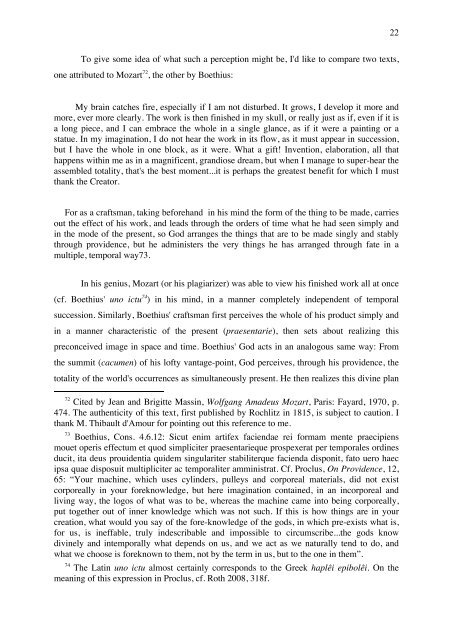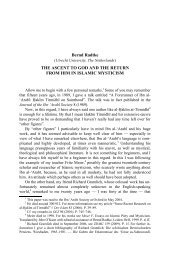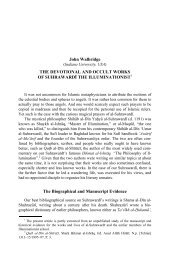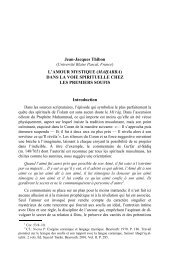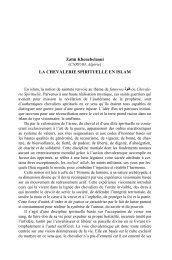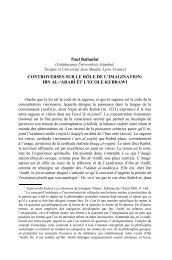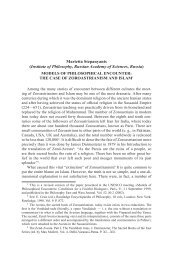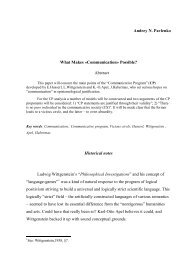Bothius talk DEF
Bothius talk DEF
Bothius talk DEF
You also want an ePaper? Increase the reach of your titles
YUMPU automatically turns print PDFs into web optimized ePapers that Google loves.
22<br />
To give some idea of what such a perception might be, I'd like to compare two texts,<br />
one attributed to Mozart 72 , the other by Boethius:<br />
My brain catches fire, especially if I am not disturbed. It grows, I develop it more and<br />
more, ever more clearly. The work is then finished in my skull, or really just as if, even if it is<br />
a long piece, and I can embrace the whole in a single glance, as if it were a painting or a<br />
statue. In my imagination, I do not hear the work in its flow, as it must appear in succession,<br />
but I have the whole in one block, as it were. What a gift! Invention, elaboration, all that<br />
happens within me as in a magnificent, grandiose dream, but when I manage to super-hear the<br />
assembled totality, that's the best moment...it is perhaps the greatest benefit for which I must<br />
thank the Creator.<br />
For as a craftsman, taking beforehand in his mind the form of the thing to be made, carries<br />
out the effect of his work, and leads through the orders of time what he had seen simply and<br />
in the mode of the present, so God arranges the things that are to be made singly and stably<br />
through providence, but he administers the very things he has arranged through fate in a<br />
multiple, temporal way73.<br />
In his genius, Mozart (or his plagiarizer) was able to view his finished work all at once<br />
(cf. Boethius' uno ictu 74 ) in his mind, in a manner completely independent of temporal<br />
succession. Similarly, Boethius' craftsman first perceives the whole of his product simply and<br />
in a manner characteristic of the present (praesentarie), then sets about realizing this<br />
preconceived image in space and time. Boethius' God acts in an analogous same way: From<br />
the summit (cacumen) of his lofty vantage-point, God perceives, through his providence, the<br />
totality of the world's occurrences as simultaneously present. He then realizes this divine plan<br />
72 Cited by Jean and Brigitte Massin, Wolfgang Amadeus Mozart, Paris: Fayard, 1970, p.<br />
474. The authenticity of this text, first published by Rochlitz in 1815, is subject to caution. I<br />
thank M. Thibault d'Amour for pointing out this reference to me.<br />
73<br />
Boethius, Cons. 4.6.12: Sicut enim artifex faciendae rei formam mente praecipiens<br />
mouet operis effectum et quod simpliciter praesentarieque prospexerat per temporales ordines<br />
ducit, ita deus prouidentia quidem singulariter stabiliterque facienda disponit, fato uero haec<br />
ipsa quae disposuit multipliciter ac temporaliter amministrat. Cf. Proclus, On Providence, 12,<br />
65: “Your machine, which uses cylinders, pulleys and corporeal materials, did not exist<br />
corporeally in your foreknowledge, but here imagination contained, in an incorporeal and<br />
living way, the logos of what was to be, whereas the machine came into being corporeally,<br />
put together out of inner knowledge which was not such. If this is how things are in your<br />
creation, what would you say of the fore-knowledge of the gods, in which pre-exists what is,<br />
for us, is ineffable, truly indescribable and impossible to circumscribe...the gods know<br />
divinely and intemporally what depends on us, and we act as we naturally tend to do, and<br />
what we choose is foreknown to them, not by the term in us, but to the one in them”.<br />
74<br />
The Latin uno ictu almost certainly corresponds to the Greek haplêi epibolêi. On the<br />
meaning of this expression in Proclus, cf. Roth 2008, 318f.


